Learning Teaching and Assessment in Singapore - Mentorship for Underachieving Students
Added on 2023-06-09
21 Pages5115 Words151 Views
Running head: LEARNING TEACHING AND ASSESSMENT (SINGAPORE)
LEARNING TEACHING AND ASSESSMENT (SINGAPORE)
Name of the student:
Name of the University:
Author note:
LEARNING TEACHING AND ASSESSMENT (SINGAPORE)
Name of the student:
Name of the University:
Author note:
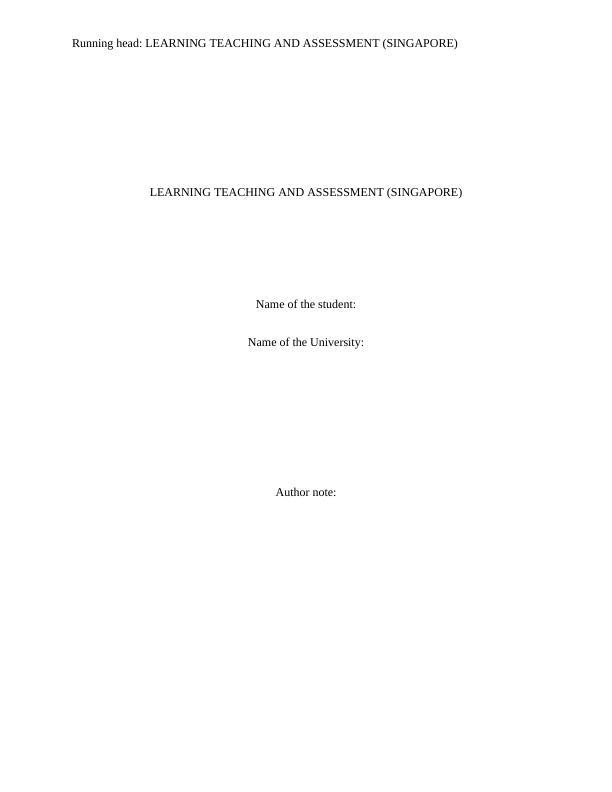
1LEARNING TEACHING AND ASSESSMENT (SINGAPORE)
Introduction:
A mentor is the role model, guide and expert who facilitates learning, assess and
supervise the students in order to help them in practice setting. In nursing a mentor is defined as
a more experienced nurse who acts as a guide and expert for the less- experienced or new nurses
(Butterworth & Faugier, 2013). Mentorship is a process of collaborative learning in which
individual involves with mutual goals and contributes their accountability to achieve positive
outcomes and success (Eller, Lev & Feurer, 2014). Mentorship is the safeguard of nursing
standard that has many advantages for example; mentorship could help to foster the leadership
skill that is important for a nurse to develop, design and deliver service in an effective manner.
Mentorship is helpful in the health care field to improve the self-confidence, moral and ethical
understanding, skills and knowledge of the nursing student. It helps the students in order to
become professional. Mentorship helps to build effective relationship with the patients and the
colleagues in the health care organization (Lindén, Ohlin & Brodin, 2013).
The assignment will explore the experience of a mentor working in the orthopaedic ward
with 15years of experience. A second year student has come to his workplace for 5 week
placement. It has been informed that the student had been underachieving in the previous
placement. The paper will share the plan of mentoring an underachieving student in the
assignment. In this regards the paper will provide brief discussion regarding the underachieving
student, role of mentor, different learning styles, impact of clinical environment on learning,
assessment to promote learning and importance of feedback in mentorship. It will also provide
reflection regarding its impact on future practice.
Introduction:
A mentor is the role model, guide and expert who facilitates learning, assess and
supervise the students in order to help them in practice setting. In nursing a mentor is defined as
a more experienced nurse who acts as a guide and expert for the less- experienced or new nurses
(Butterworth & Faugier, 2013). Mentorship is a process of collaborative learning in which
individual involves with mutual goals and contributes their accountability to achieve positive
outcomes and success (Eller, Lev & Feurer, 2014). Mentorship is the safeguard of nursing
standard that has many advantages for example; mentorship could help to foster the leadership
skill that is important for a nurse to develop, design and deliver service in an effective manner.
Mentorship is helpful in the health care field to improve the self-confidence, moral and ethical
understanding, skills and knowledge of the nursing student. It helps the students in order to
become professional. Mentorship helps to build effective relationship with the patients and the
colleagues in the health care organization (Lindén, Ohlin & Brodin, 2013).
The assignment will explore the experience of a mentor working in the orthopaedic ward
with 15years of experience. A second year student has come to his workplace for 5 week
placement. It has been informed that the student had been underachieving in the previous
placement. The paper will share the plan of mentoring an underachieving student in the
assignment. In this regards the paper will provide brief discussion regarding the underachieving
student, role of mentor, different learning styles, impact of clinical environment on learning,
assessment to promote learning and importance of feedback in mentorship. It will also provide
reflection regarding its impact on future practice.
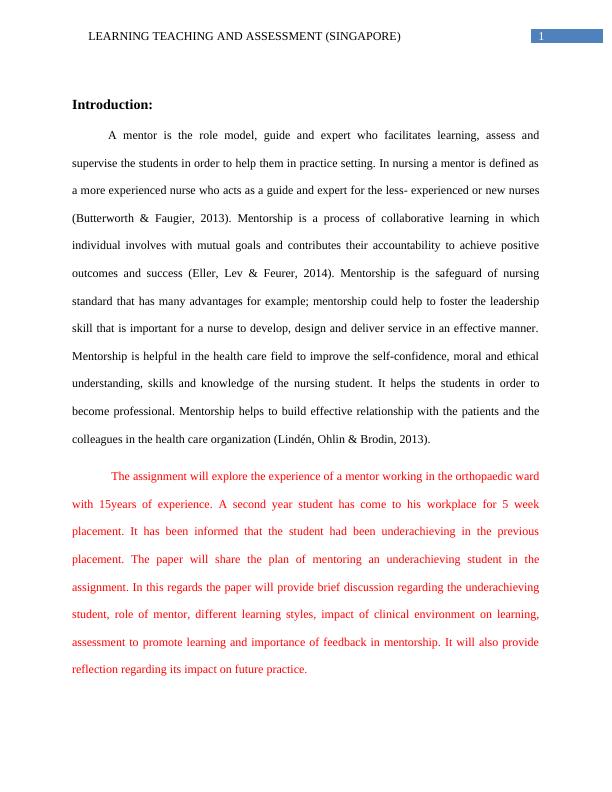
2LEARNING TEACHING AND ASSESSMENT (SINGAPORE)
First day orientation:
In order to proceed with mentorship a planned orientation program has been prepared that
includes interview of the mentee in order to identify the learning needs and issues that have risen
in the previous learning session. It has helped to introduce effective learning process that could
help the student to achieve expected outcomes. A session to discuss the roles and responsibilities
of the mentee and importance of clinical environment has been arranged. It has helped the
mentee to understand the individual role and responsibility and participate in the learning session
in an effective manner. The mentee has been introduced to the other nurses, doctors and staffs of
the hospital. It has helped him to feel welcomed, reduce nervousness and settle down in the new
environment.
Motivation is very important for the students to engage in the learning process.
Motivation can be intrinsic or extrinsic. For example, intrinsic motivation is enjoying the
learning process for own sake and positive outcomes. On the other hand extrinsic motivational
factors include achieving external reward (Nuttin, 2014). Information about the motivational
factors such as use the knowledge in the nursing practice, becoming a successful nurse, provide
service to the people with need and secure future has been provided to the mentee. Adequate
information regarding the Singapore nursing board has been provided to the student. For
example the required nursing skills such as compassion for serving people with need, effective
communication skill, knowledge of ethics, power of critical thinking, confidence, adaptability
and commitment to develop service. The learning objectives have been shared with the mentee.
In this regards an action plan has been prepared based on the SMART goal framework in order
to achieve the desired outcomes within the time frame that is 5 weeks. It was expected that the
mentee will participate in the learning process effectively and follow the instructions of the
First day orientation:
In order to proceed with mentorship a planned orientation program has been prepared that
includes interview of the mentee in order to identify the learning needs and issues that have risen
in the previous learning session. It has helped to introduce effective learning process that could
help the student to achieve expected outcomes. A session to discuss the roles and responsibilities
of the mentee and importance of clinical environment has been arranged. It has helped the
mentee to understand the individual role and responsibility and participate in the learning session
in an effective manner. The mentee has been introduced to the other nurses, doctors and staffs of
the hospital. It has helped him to feel welcomed, reduce nervousness and settle down in the new
environment.
Motivation is very important for the students to engage in the learning process.
Motivation can be intrinsic or extrinsic. For example, intrinsic motivation is enjoying the
learning process for own sake and positive outcomes. On the other hand extrinsic motivational
factors include achieving external reward (Nuttin, 2014). Information about the motivational
factors such as use the knowledge in the nursing practice, becoming a successful nurse, provide
service to the people with need and secure future has been provided to the mentee. Adequate
information regarding the Singapore nursing board has been provided to the student. For
example the required nursing skills such as compassion for serving people with need, effective
communication skill, knowledge of ethics, power of critical thinking, confidence, adaptability
and commitment to develop service. The learning objectives have been shared with the mentee.
In this regards an action plan has been prepared based on the SMART goal framework in order
to achieve the desired outcomes within the time frame that is 5 weeks. It was expected that the
mentee will participate in the learning process effectively and follow the instructions of the
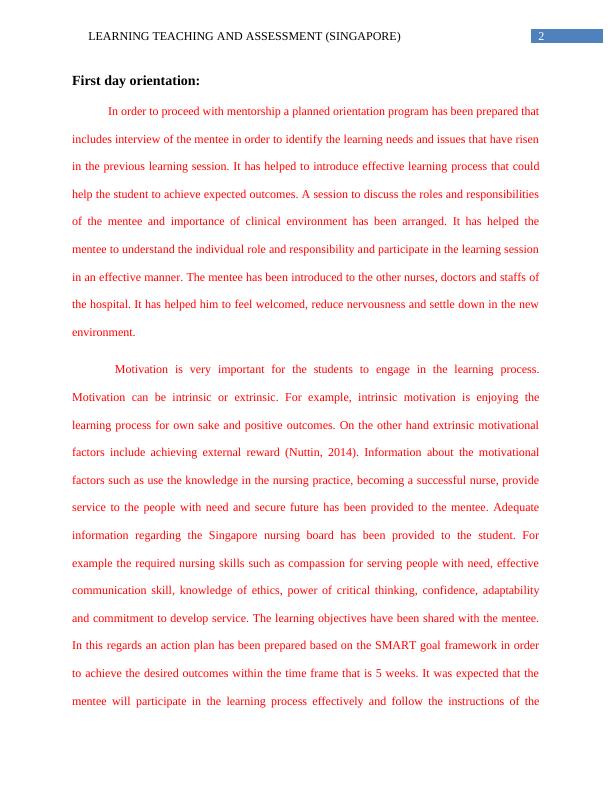
3LEARNING TEACHING AND ASSESSMENT (SINGAPORE)
mentor in order to improve skills. He would not avoid his responsibilities and maintain all the
rules of the institution. It was expected that the learning process will help the student to
overcome his issues and become a successful nurse in future. In this regards essential learning
resources such as text books, other reading materials, videos, charts, software and recordings has
been arranged to provide the student adequate support so that he could involve in the learning
process and achieve desired outcomes.
Under achieving student:
Underachieving student is defined as the students that face constant failure in achieving
realistic anticipants according to their capabilities. Such students are considered as substandard
by their peer. They lack self-confidence, ability and persistence to comply with the goals and fail
to achieve expected outcomes. Some underachieving students are unable to control their anxiety
and some feel shy in asking questions. However, it has been found that underachieving students
score high in the aptitude and achievement test but they fail to perform well in the assignments
due to lack of concentration. It has been found that many of them have the ability to understand
learning concepts orally but they fail to implement such knowledge. Thus, at the end they
become disappointed due to lack of motivation and give up completely (Freda, González-
Monteagudo & Esposito, 2016).
However, there are some consequences of not failing the students for example in some
cases mentors fail to link the performance of the student with the learning outcomes and fail to
identify the underachieving students. Sometimes mentors consider the failure of a student with
their personal failure thus avoid failing a student to avoid tension between their professional role,
career and nurture. In some cases students could manipulate the system or the mentor in order to
mentor in order to improve skills. He would not avoid his responsibilities and maintain all the
rules of the institution. It was expected that the learning process will help the student to
overcome his issues and become a successful nurse in future. In this regards essential learning
resources such as text books, other reading materials, videos, charts, software and recordings has
been arranged to provide the student adequate support so that he could involve in the learning
process and achieve desired outcomes.
Under achieving student:
Underachieving student is defined as the students that face constant failure in achieving
realistic anticipants according to their capabilities. Such students are considered as substandard
by their peer. They lack self-confidence, ability and persistence to comply with the goals and fail
to achieve expected outcomes. Some underachieving students are unable to control their anxiety
and some feel shy in asking questions. However, it has been found that underachieving students
score high in the aptitude and achievement test but they fail to perform well in the assignments
due to lack of concentration. It has been found that many of them have the ability to understand
learning concepts orally but they fail to implement such knowledge. Thus, at the end they
become disappointed due to lack of motivation and give up completely (Freda, González-
Monteagudo & Esposito, 2016).
However, there are some consequences of not failing the students for example in some
cases mentors fail to link the performance of the student with the learning outcomes and fail to
identify the underachieving students. Sometimes mentors consider the failure of a student with
their personal failure thus avoid failing a student to avoid tension between their professional role,
career and nurture. In some cases students could manipulate the system or the mentor in order to
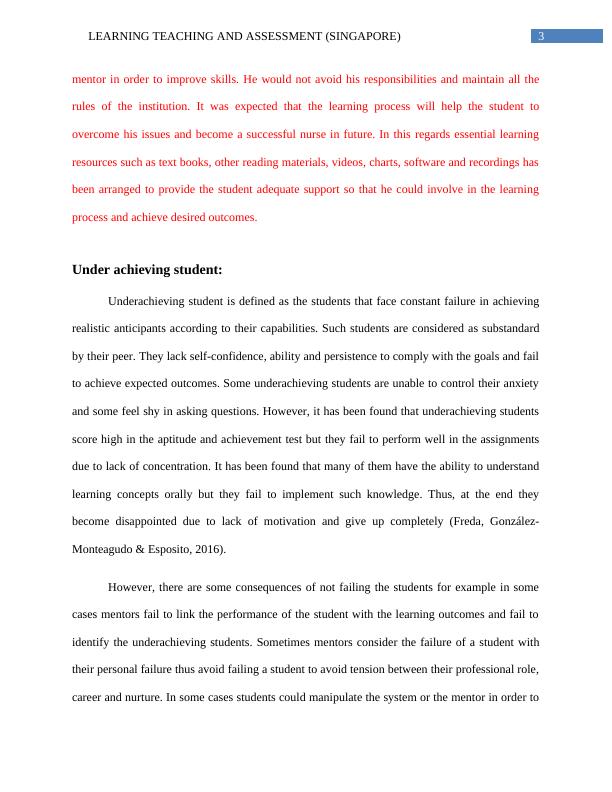
4LEARNING TEACHING AND ASSESSMENT (SINGAPORE)
avoid failure or the personal issues could influence a mentor to avoid the fail case. In case of
such incidents the mentor fails to recognize or avoid an underachieving student (Lancia et al.,
2013). Thus, more focus is needed to understand the behaviour of underachieving students to
identify their problem and address them in order to achieve expected outcomes.
Role of mentor in clinical practice:
The activities of a mentor include teaching, supervision, explaining, support and motivate
the student. It is important for the mentor to belief on the student’s ability and help the student in
order to achieve expected outcomes. It is the responsibility of the mentor to establish mutual
relationship with the student in order to facilitate the learning process. It helps the satisfaction
and successful career for both the student and the mentor. In this regards the mentor needs to use
effective communication and commitment (Butterworth & Faugier, 2013). Another vital role of
the mentor in clinical practice is to assess effective nursing practice of the student for registering.
It is the responsibility of the mentor to identify the learning issues, introduce effective
interventions and provide adequate resources. The mentor needs to portray a good role model. It
is important to discuss the objectives of learning so that the mentee could understand the rational
of the assessment (Chen & Lou, 2014).
Learning styles and their application:
There are different kinds of learner and according to their ability different learning styles
are also present. The VAK scale is the most applicable process to identify the learning styles of
the student. According to the VAK scale the learners are classified into three categories such as
visual learner, auditory learner, and kinaesthetic learner. The visual learners usually learn from
avoid failure or the personal issues could influence a mentor to avoid the fail case. In case of
such incidents the mentor fails to recognize or avoid an underachieving student (Lancia et al.,
2013). Thus, more focus is needed to understand the behaviour of underachieving students to
identify their problem and address them in order to achieve expected outcomes.
Role of mentor in clinical practice:
The activities of a mentor include teaching, supervision, explaining, support and motivate
the student. It is important for the mentor to belief on the student’s ability and help the student in
order to achieve expected outcomes. It is the responsibility of the mentor to establish mutual
relationship with the student in order to facilitate the learning process. It helps the satisfaction
and successful career for both the student and the mentor. In this regards the mentor needs to use
effective communication and commitment (Butterworth & Faugier, 2013). Another vital role of
the mentor in clinical practice is to assess effective nursing practice of the student for registering.
It is the responsibility of the mentor to identify the learning issues, introduce effective
interventions and provide adequate resources. The mentor needs to portray a good role model. It
is important to discuss the objectives of learning so that the mentee could understand the rational
of the assessment (Chen & Lou, 2014).
Learning styles and their application:
There are different kinds of learner and according to their ability different learning styles
are also present. The VAK scale is the most applicable process to identify the learning styles of
the student. According to the VAK scale the learners are classified into three categories such as
visual learner, auditory learner, and kinaesthetic learner. The visual learners usually learn from
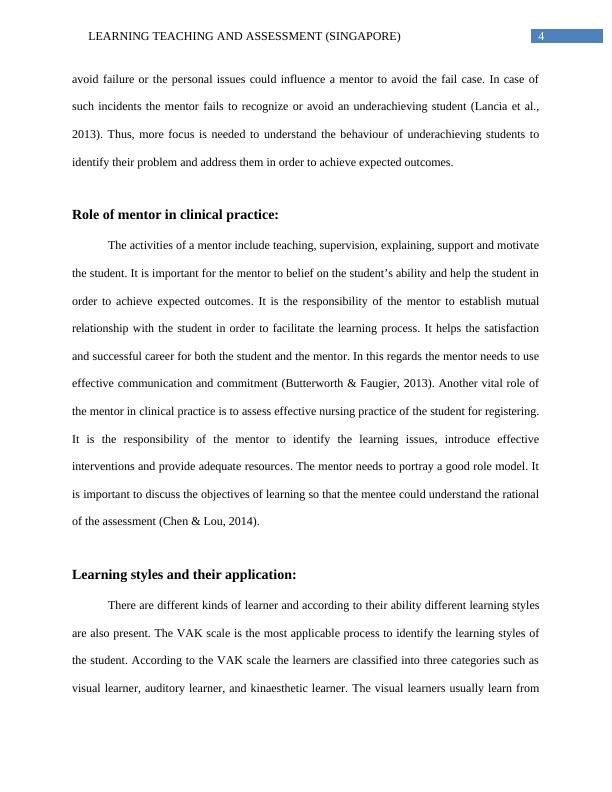
5LEARNING TEACHING AND ASSESSMENT (SINGAPORE)
visual displays. In such learning process image, chart, videos, presentation, signs and diagram
play an important role. Auditory learners mostly show their interest in verbal instructions like
lecture and they utilize different discussion in order to learn new things and improve their skills.
Such learning style helps to recollect sound and develop knowledge in words and language.
Kinaesthetic learning process includes learning through different actions. The kinesthetic
learners learn through hands-on practice and they like to move around while learning. Each
learning style is applicable for student according to their need, interest and capability (Urval et
al., 2014).
It is important to understand the learning style of the student in order to utilize
appropriate learning theory to address the issues of the student. In this case using the VAK scale
it has been found that the underachieving student is kinaesthetic learner thus he has failed to
learn from auditory and visual learning process that has been used in the previous session. Thus,
it is important to use theory and interventions that are related to kinaesthetic learning styles to
improve and facilitate the learning of the student.
Application of learning theories:
Effective learning theories help a mentor to identify individual requirements and help to
introduce effective interventions. Some important learning theories are discussed below.
Pedagogy learning theory: The theory is related to the traditional learning process. It provides
the concept of teacher centred, rote and content focus learning. In this process the mentor decides
learning content, strategies, timing and assessment that are required. Thus, the pedagogy theory
advocates for the overall responsibilities of the mentor (Schmeck, 2013).
visual displays. In such learning process image, chart, videos, presentation, signs and diagram
play an important role. Auditory learners mostly show their interest in verbal instructions like
lecture and they utilize different discussion in order to learn new things and improve their skills.
Such learning style helps to recollect sound and develop knowledge in words and language.
Kinaesthetic learning process includes learning through different actions. The kinesthetic
learners learn through hands-on practice and they like to move around while learning. Each
learning style is applicable for student according to their need, interest and capability (Urval et
al., 2014).
It is important to understand the learning style of the student in order to utilize
appropriate learning theory to address the issues of the student. In this case using the VAK scale
it has been found that the underachieving student is kinaesthetic learner thus he has failed to
learn from auditory and visual learning process that has been used in the previous session. Thus,
it is important to use theory and interventions that are related to kinaesthetic learning styles to
improve and facilitate the learning of the student.
Application of learning theories:
Effective learning theories help a mentor to identify individual requirements and help to
introduce effective interventions. Some important learning theories are discussed below.
Pedagogy learning theory: The theory is related to the traditional learning process. It provides
the concept of teacher centred, rote and content focus learning. In this process the mentor decides
learning content, strategies, timing and assessment that are required. Thus, the pedagogy theory
advocates for the overall responsibilities of the mentor (Schmeck, 2013).
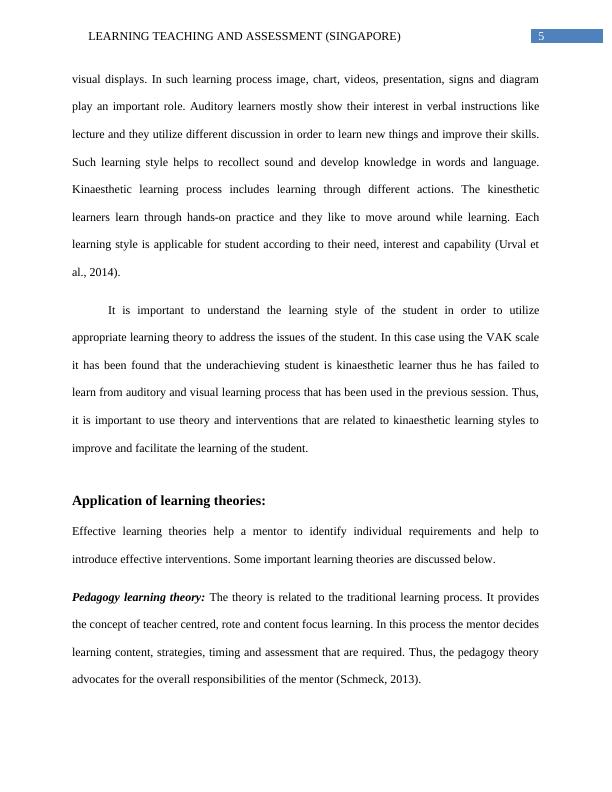
End of preview
Want to access all the pages? Upload your documents or become a member.
Related Documents
Learning, Teaching and Assessment in Practice - Essay Planlg...
|4
|833
|230
Learning, Teaching and Assessment in Practicelg...
|17
|5455
|245
Assessment Learning and Teaching in Practicelg...
|12
|4526
|493
Essentials of Mentorship in Nursing: Strategies for Effective Teaching and Learninglg...
|18
|5121
|408
Mentorship in Nursing: Developing Learning, Assessment and Instructing Approacheslg...
|18
|5018
|105
Learning, Teaching and Assessment in Practicelg...
|16
|4357
|255
